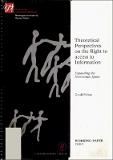| dc.contributor.author | Feltoe, Geoff | |
| dc.date.accessioned | 2015-08-28T07:59:11Z | |
| dc.date.available | 2015-08-28T07:59:11Z | |
| dc.date.issued | 1998 | |
| dc.identifier.citation | Feltoe, G. (1998) Theoretical Perspectives on the Right to Access to Information: Expanding the Democratic Space. Working Paper 1998, no. 5. UZ, Mt. Pleasant, Harare: UZ/NIHR. | en |
| dc.identifier.uri | https://opendocs.ids.ac.uk/opendocs/handle/20.500.12413/6882 | |
| dc.description | A working paper on the theoretical rights to access of information from a legalistic perspective. Working Paper Prepared at the Research Project “The Right to Access to Information as Essential Factor of Democracy”, organised as a NUFU Link Programme between the Department of Public Law, University of Zimbabwe, and the Norwegian Institute of Human Rights, No. 5. University of Oslo, Oslo 1998. | en |
| dc.description.abstract | Birkinshaw points out that that information is a feature of power and so too is its control, use and regulation. Those possessing and controlling information have power and their power is augmented if they have exclusive use of that information.1 The possessors of information often disallow access to their information. Sometimes the reasons for refusal to allow access may be legitimate, but often they are not.
Modem governments engage in a huge range of activities and hold massive amounts of information. Yet almost all governments jealously guard the information in their possession and are most reluctant to surrender it. The dominant culture in government systems is still a culture of secrecy. So too in the private sector. Economic globalisation and the prevalent trend of liberalisation of economies by governments, for instance privatising state enterprises, has placed enormous power into the hands of private commercial enterprises. Much of the information possessed by these organisations is kept secret and is not accessible.
This paper examines the dangers of allowing a culture of secrecy to prevail both within the public and private sectors and explores what is required to transform this culture and to allow far more access to information. It also, however, accepts that that there are certain types of information that both public and private bodies are fully justified in keeping secret such as military secrets during times of war or trade secrets. | en |
| dc.description.sponsorship | NUFU Link Programme ( Norway, Oslo) | en |
| dc.language.iso | en | en |
| dc.publisher | University of Zimbabwe (UZ) Publications./ Norweian Institute of Human Rights (NIHR.) | en |
| dc.rights.uri | http://creativecommons.org/licenses/by-nc-nd/3.0/ | en |
| dc.subject | Rights | en |
| dc.title | Theoretical Perspectives on the Right to Access to Information: Expanding the Democratic Space | en |
| dc.type | Series paper (non-IDS) | en |


